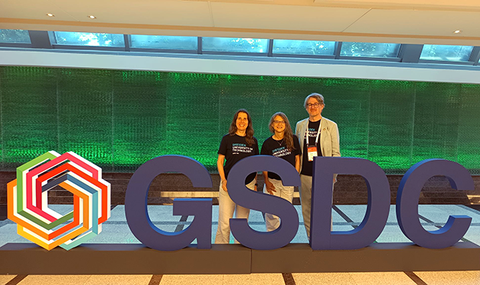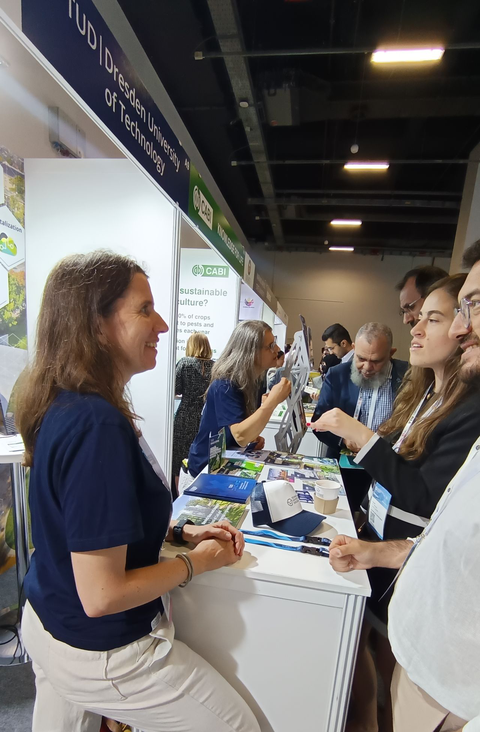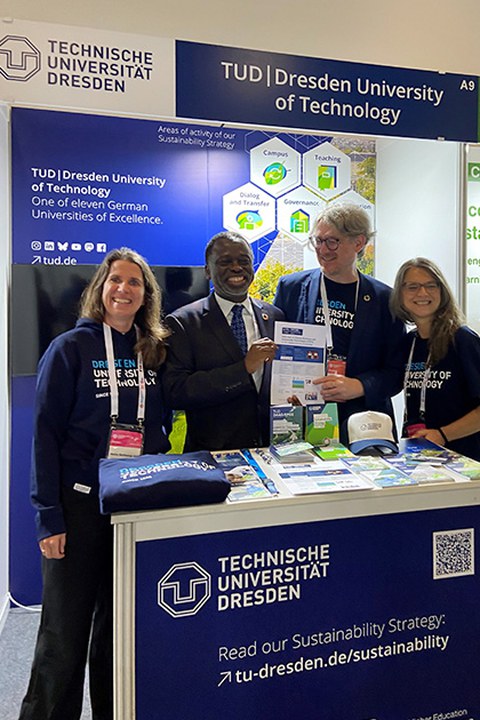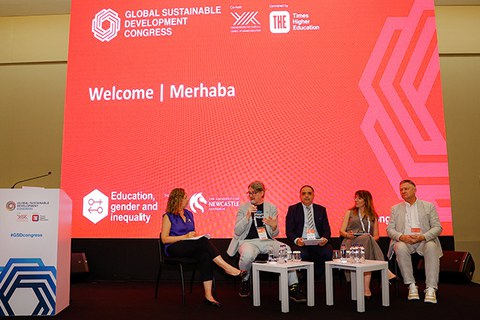Jun 21, 2025
TU Dresden at the Global Sustainable Development Congress 2025: Top position in THE Impact Ranking reconfirmed

TUD representatives at GSDC 2025: Maike Heitkamp-Mai (Sustainability Officer), Claudia Seiler (Communication Advisor) and Dr. André Lindner (Managing Director & Advisor Internationalisation School of Civil and Environmental Engineering)
TUD Dresden University of Technology's (TUD) presence at the Global Sustainable Development Congress (GSDC) 2025 attracted a diverse audience of experts from academia, government, business, civil society and students.
From 16 to 19 June, TUD representatives Dr. André Lindner, Maike Heitkamp-Mai and Claudia Seiler reached numerous interested parties at the event in Istanbul, Turkey, who learned about TUD's education portfolio, current and upcoming research projects and sustainability strategy. At the stand, there was an intensive exchange on challenges and best practices on the way to sustainable educational institutions, and there were also opportunities to talk about possible (strategic) partnerships between academic institutions.

Sustainability Officer Maike Heitkamp-Mai shared insights into TUD’s sustainability strategy.
International prospective students were particularly interested in the wide range of internationally oriented English-language Master's degree courses, such as the ABCD Center 's Water Security & Global Change. Doctoral students were given an insight into the PhD program Resource Nexus for Sustainability Transformations (NEXtra) and the postgraduate training programs of the Centre for International Postgraduate Studies of Environmental Management CIPSEM, which has been implementing the courses initiated by UNEP, UNESCO and the Federal Ministry for the Environment, Climate Action, Nature Conservation and Nuclear Safety
(BMUKN) at TUD since 1977.

Prof. Marwala joined the TU Dresden team for an in-depth exchange at the university’s exhibition stand, where discussions focused on the future direction of the UNU Hub CREST.
In line with the congress focus on sustainable development, the TUD presented not only its successes with innovative projects in the context of sustainability—such as CARE and REC² in the current Excellence Strategy—but also its latest cooperation on the sustainable use of resources with the United Nations University (UNU): the UNU Hub on Climate Resilience and Sustainable Technologies (CREST). A dialog on the future direction of the Hub was initiated with Prof. Tshilidzi Marwala, Rector of the United Nations University (UNU) and Assistant Secretary-General of the United Nations, who visited the TU Dresden stand. Within this hub, an international and interdisciplinary interface for climate resilience and sustainable technologies is to be established in Dresden in close partnership with UNU-FLORES.

Dr. André Lindner as guest at the panel session moderated by Iveta Silova (ASU).
On the second day of the event, the TUD experienced two highlights.
The first was the panel discussion Forging the Future: Developing the Next Generation of Leaders for a Sustainable World, moderated by Prof. Iveta Silova from Arizona State University, global partner in the EUTOPIA alliance. University leaders and industry experts explored how academic institutions can equip future leaders with the skills needed for sustainability, innovation, and global responsibility. The discussion focused on the role of curricula, interdisciplinary collaboration, and partnerships with industry. Dr. André Lindner represented TU Dresden as an invited speaker and actively contributed to the session.
The second highlight was the announcement of the Times Higher Education (THE) Impact Ranking, where TUD once again achieved a leading global position in the sustainability category "Industry, Innovation and Infrastructure" (SDG 9).
This year’s congress once again provided a vital platform for dialogue among university and business leaders, policymakers, top researchers, and NGOs on innovation, research, sustainability, and the implementation of the SDGs. As an important exhibition partner, the TUD had the opportunity not only to showcase its own strengths and innovative capacity, but also to contribute to the international visibility of Germany’s higher education and research landscape.
